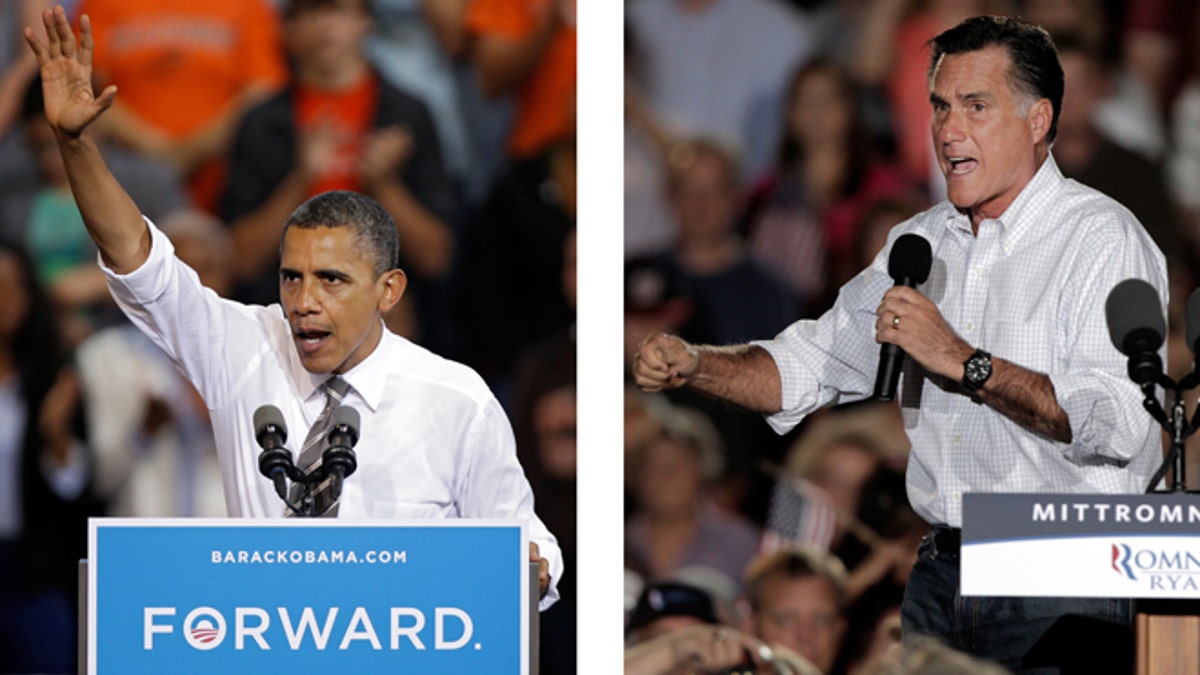
FILE - In these Sept. 26, 2012, file photo, President Barack Obama and Republican presidential candidate Mitt Romney both campaign in the battleground state of Ohio. Fierce and determined competitors, Obama and Romney each have a specific mission for the string of three debates that starts Wednesday night, Oct. 3, 2012. Obama, no longer the fresh face of 2008, must convince skeptical Americans that he can accomplish in a second term what he couldn't in his first: restore the U.S. economy to full health. Romney, anxious to keep the race from slipping away, needs to instill confidence that he is a credible and trusted alternative to the president, with a better plan for strengthening the fragile economy. (AP Photos) (AP)
According to the latest Gallup poll, Mitt Romney has leapt from a significant deficit to a 2-point lead in the wake of his widely lauded Presidential debate performance. He is simultaneously closing in on Obama’s lead in several swing states.
This dramatic change may turn out to be even more meaningful when viewed through a lens that properly values the psychological power of incumbency.
A shift by the electorate away from an incumbent president has more in common with divorce than it does with opting against a second date.
When Americans bond with a president for more than three years, the decision to back a different candidate often comes only after much soul-searching and an extreme level of discomfort. When real disappointment sets in, and voters finally voice their intention to support the challenger, their decision can be permanent. They may be saying that the relationship is, finally, beyond repair—that there is no going back.
In my practice, marriages rarely end over a single event or disappointment. But, one event can, indeed, represent a breaking point when dissatisfaction has been simmering for months or years. The first presidential debate was such an event.
For the sake of metaphor, think of any friend who has called you and, after a tumultuous, but passionate, relationship, finally, finally, come to the realization that her husband isn’t the man she thought he was—at all.
[pullquote]
It isn’t that her husband hasn’t failed her before; he has. But something happens to crystallize her intent to move on—a particularly harsh comment from him, a single and obvious lie (one too many). And when she announces she is leaving, and you hear resolve, rather than wistfulness, in her voice, you know she is not turning back. She isn’t making a show of packing her bags; she’s moving out.
Finally.
Well, millions of voters may now have packed their bags and moved out, after a whirlwind romance with President Obama and a relatively short marriage marred by unemployment, constant arguing, name-calling, signs he never much liked them, anyhow (at least not the patriotic ones), and one of those terrible nights (debate night) when (in those words that any man who has gravely disappointed a woman has heard) he “had nothing to say for himself.”
Sure, some incumbents bounce back from deficits (double entendre intended), but this analysis of the president permanently plummeting in polls may be even more true given that tens of millions of Americans didn’t just support him; they actually fell a little in love with him. They swooned over him. Now, the honeymoon seems finally to be over. And, for anyone who has tried going on a second honeymoon, they’ll tell you that you really can’t. It just isn’t the same.
Moreover, I believe many Americans who fell for President Obama based their relationship with him on more than just agreeing with his policies.
In my opinion, they also valued the relationship because it symbolized the wonderful distance America has traveled away from prejudice.
While no one would argue there might be some Americans who refused to vote for the president because of his color, no one can credibly argue that some Americans didn’t vote for him precisely because he is a person of color. And these voters, especially, I believe, felt real regret telling pollsters that President Obama had lost their votes—regret for what might have been: not only the election of the first black president of the United States (a truly inspiring event), but the re-election of a black president they had sincerely hoped would be successful.
Once that hope was shattered by reality, and these folks actually admitted it—not only to themselves, but to pollsters on the telephone—it may have become, almost instantly, impossible to restore.
Crushes based on appearance tend to fall like lead balloons when the good-lookin’ person who made your heart race humiliates you in front of your friends.
And millions of people who had hopped into bed with the president hoping for the best in 2008 must have felt pretty humiliated waking up the morning after the first presidential debate.
